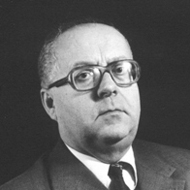Dvořáček Jiří
- Year of Birth - Death :
- 1928 - 2000
Biography
Jiri Dvoracek gained his first musical experience in the musical hinterland of his family. His grandfather was a band leader at Vamberk, his father played violin and flute, his mother played piano. His road to music was straightforward, without any diversions. The foundations gained in his native Vamberk were followed by studies at the organ department of the Prague Conservatory (1943 - 1947). After a two years span working as an organist and music teacher at Vrchlabi and Slany and increasing concentration on his own compositional work and preparation for more studies of composition, he was admitted in 1949 to the class of composition of the Faculty of Music of the Prague Academy of Arts and Music where he studied till 1953 as a pupil of J. Ridky and then V. Dobias. He graduated with a Symphony for large orchestra which commanded respect due to the level of compositional work, cultured expression and the way in which he mastered the given form. Upon graduating Jiri Dvoracek stayed at the Academy and he was teaching there until 1989 (since 1979 as a Professor and head of the department of composition). Aside from his activity as a composer and teacher, we must mention his organisational work, in particular in the Union of Czech Composers and Concert Artists and in the Czech Music Fund, where he was the Board Chairman (until 1990).
In his works, Jiri Dvoracek is linked with the main stream of the development of Czech music of the 20th century without losing sight of valuable exploits of contemporary classical music. A place of special importance belongs to his works in vocal and vocal symphonic genres which express his personal orientation clearly and with great force of persuasion. A series of clean-cut songs and choirs permeates the whole of his development so far, and forms a clear line with two largescale works: Aphrodite's Island, an opera inspired by the theme of people's fight for independence, freedom and social justice (premiered in the German Democratic Republic in 1971) and I Am Living and Singing, a cantata - setting of contemporary poetry which resounded for the first time at the 1979 Week of New Works by Czech Composers. Symphonic creation has a place of no smaller importance in Dvoracek's work, which showed right from the beginning a composer's sense of sharp, refinement and adequate instrumental expression (for instance, Concertant Suite and symfonietta Quattro Episodi). The traits of refinement and stylistic perfection are inherent in other Dvoracek compositions dedicated to individual instruments or instrumental chamber ensembles; they include piano Sonatina di bravura, Music for Harp, Brass Quintet, two rondos for French Horn and piano called Due per duo, Music for Viola and Piano, etc. We could go on with a list of small instrumental and vocal compositions, songs and choirs for children, as well as instrumental compositions with pedagogical orientation. All of them carry features of perfect compositional work and convicing musicality. Jiri Dvoracek has received many awards and distinctions for his work. He was named Artist of Merit in 1983.
© 2012-2025 Musicbase.cz
Webdesign & hosting Nux Ltd.
Information about web | Sitemap | RSS | Statistics | CMS
Contact information
Music information center, o.p.s.
tel: 257 312 422 | e-mail: his@musica.cz

